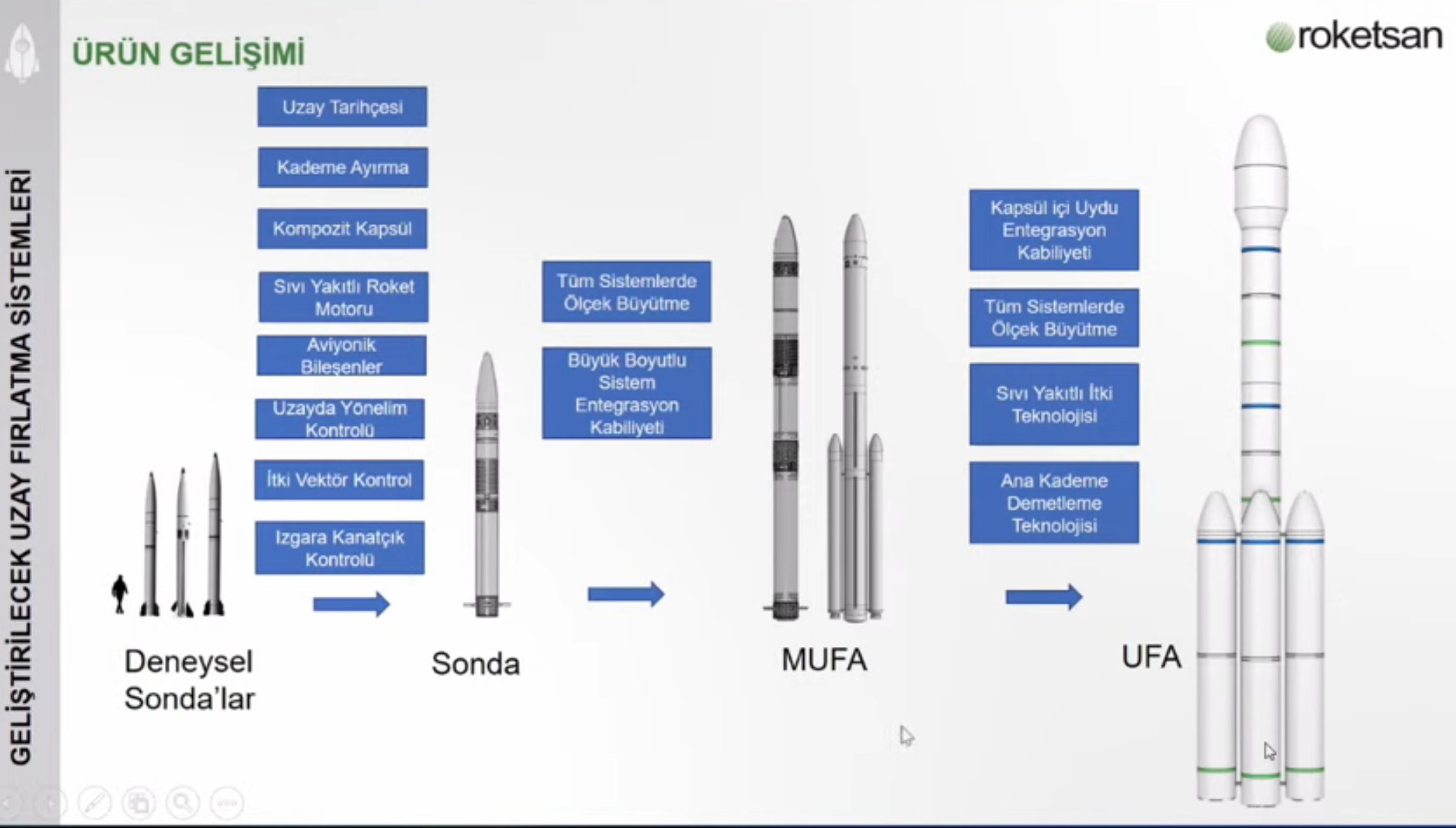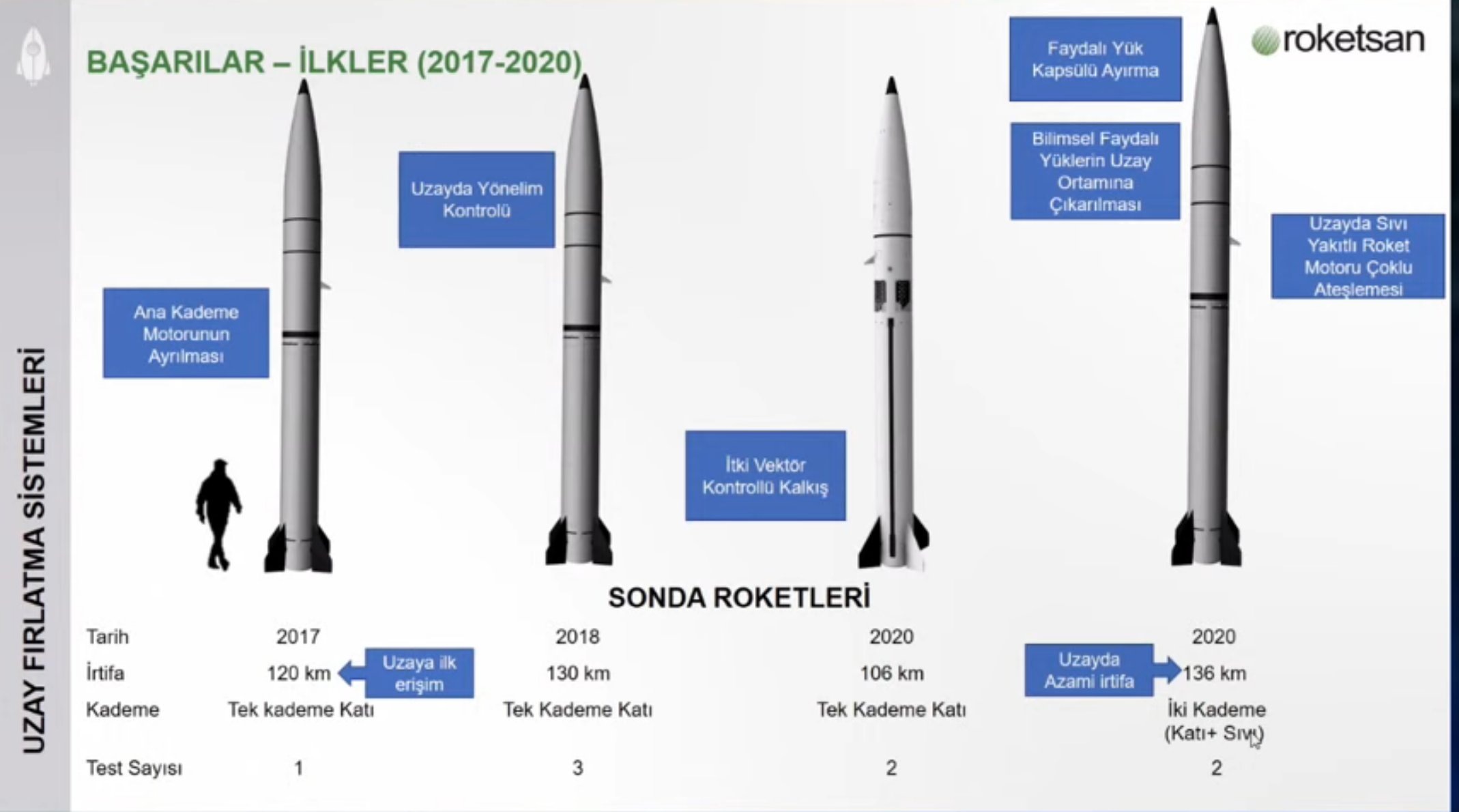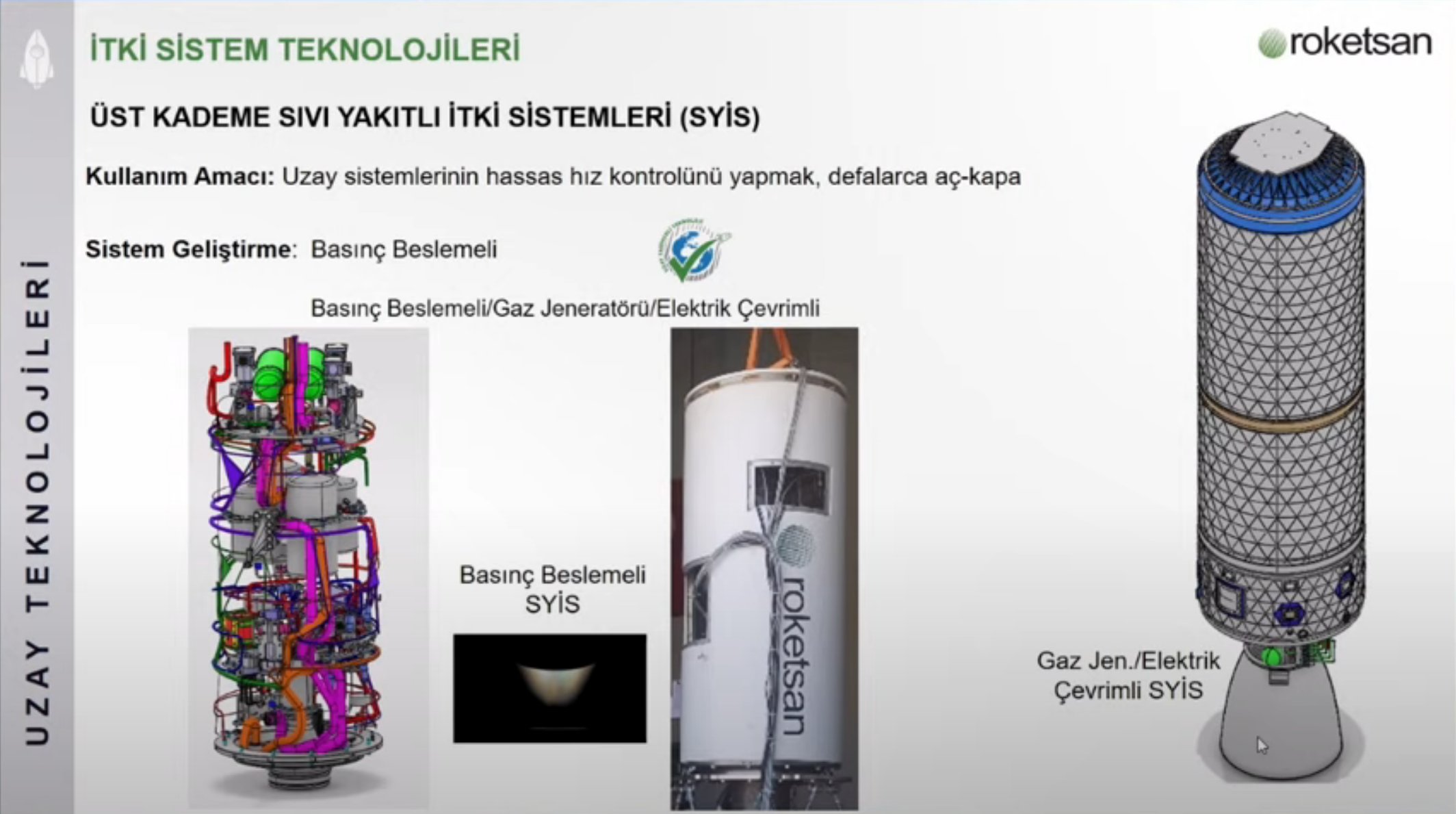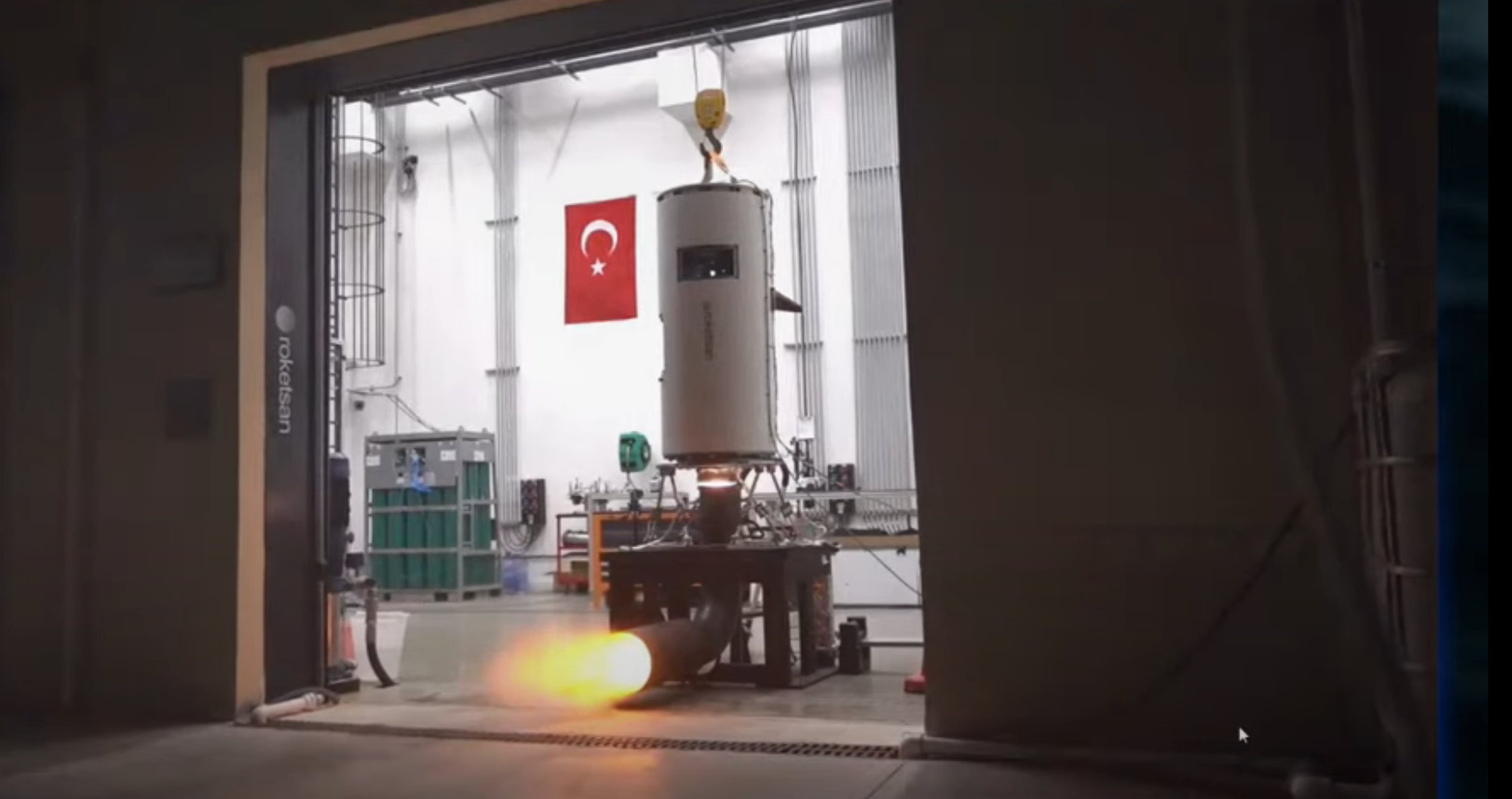Turkey sent 4 sounding rockets into space last month
How to install the app on iOS
Follow along with the video below to see how to install our site as a web app on your home screen.
Note: This feature may not be available in some browsers.
You are using an out of date browser. It may not display this or other websites correctly.
You should upgrade or use an alternative browser.
You should upgrade or use an alternative browser.
Turkish Space Programs
- Thread starter cabatli_53
- Start date
[TR]AHMET
SENIOR MEMBER

- Joined
- May 16, 2010
- Messages
- 2,220
- Reaction score
- 2
- Country
- Location
why 4 sounding rocket same month ?Turkey sent 4 sounding rockets into space last month
maybe different types and different companies sent those rockets into space something like Roketsan, Delta V.
SpaceMan18
BANNED

- Joined
- Aug 10, 2020
- Messages
- 2,339
- Reaction score
- 0
- Country
- Location
Turkey sent 4 sounding rockets into space last month
I'm happy to see Turkey in space , the reason for so many sounding rockets is for design on a future much more heavier payload rocket. Not sure if Turkey is using solid fuel or liquid.
Liquid is better cause you have more control , however solid is good for missiles.
I'm sure Turkey can make low cost space launch systems , I'm surprised they aren't working with Ukraine on rocket engines.
Today, I watched two documentaries about private space companies (Blue origin, Space X ) and the race between those two companies and how they are working to achieve their goals. How they reached to this technology in couple of years ? We should speed up our works and we should start designing a reusable missiles. Really, it's a great topic and will be very important to our region if we succeed. I hope we will have a private company that create such a great rockets with advanced technology.
List of the most innovative space companies(private companies) - 2020
https://www.fastcompany.com/90457907/space-most-innovative-companies-2020
It's possible , but the government needs to work on funding it heavily with billions of dollars.
Turkey can make their own Falcon 9 , again time and money is the issue.
Last edited:
karamany98
FULL MEMBER
New Recruit
- Joined
- Oct 17, 2020
- Messages
- 59
- Reaction score
- 0
- Country
- Location
Who has a better space program: Turkey or Iran?
Turkey is just stepped into this area in 2018, iran sent some stuff a decade ago.
for me sending a man into space is waste of resources for TURKEY, iran may pursue it because they are dictatorship and needs to say to its people always "important news".
despite more than a decade of work they have only orbited 40-45 kg micro satellite into space that Turkey probably has this capability today. in the near future Turkey is planning to reach 400km range with a 100kg payload.
from roketsan page

MICRO-SATELLITE LAUNCHING SYSTEM
The Micro-Satellite Launching System (MSLS) that will give Turkey independent access to space will be developed by Roketsan under a contract signed between the Presidency of Defence Industries (SSB) and Roketsan in 2018. Once the MSLS Development Project launched under the contract has been completed, it will be possible to put satellites with a maximum weight of 100 kilograms into a low earth orbit at a minimum altitude of 400 kilometers. In addition to the development of the Micro-Satellite Launching (MSL) Vehicle, Roketsan will also build testing and production facilities as well as a launch base.
Roketsan has been continuing its efforts to develop a satellite launching system since 2007. Roketsan’s Department for the Design of Satellite Launching Systems set up in 2008 was the first department established in Turkey within a defence company charged with undertaking projects concerning satellite launching systems. The MSL Project Preliminary Conceptual Design Period (Period 1) that began in 2013 under an agreement concluded between the SSB and Roketsan related to the development of a Satellite Launching System to meet a requirement of the Air Force Command was completed in 2014. Roketsan’s activities related to space are being carried out by the Space Systems Directorate established under the Department of Advanced Technologies and Systems Group founded in 2015.
Roketsan, says that satellite launching systems are a natural outcome of the company’s growth: “Space projects represent an area in which Turkey has proven its presence, and Roketsan is the only Turkish company developing launch systems, as the most critical components of these projects. With an awareness of the responsibility related to this mission, we have been making preparations for many years. We have significant resources and the necessary know-how for the development of such systems, although we are aware that there is a lot that we need to learn and try, and this is why we continue our efforts at an increasing pace.”
for me sending a man into space is waste of resources for TURKEY, iran may pursue it because they are dictatorship and needs to say to its people always "important news".
despite more than a decade of work they have only orbited 40-45 kg micro satellite into space that Turkey probably has this capability today. in the near future Turkey is planning to reach 400km range with a 100kg payload.
from roketsan page

MICRO-SATELLITE LAUNCHING SYSTEM
The Micro-Satellite Launching System (MSLS) that will give Turkey independent access to space will be developed by Roketsan under a contract signed between the Presidency of Defence Industries (SSB) and Roketsan in 2018. Once the MSLS Development Project launched under the contract has been completed, it will be possible to put satellites with a maximum weight of 100 kilograms into a low earth orbit at a minimum altitude of 400 kilometers. In addition to the development of the Micro-Satellite Launching (MSL) Vehicle, Roketsan will also build testing and production facilities as well as a launch base.
Roketsan has been continuing its efforts to develop a satellite launching system since 2007. Roketsan’s Department for the Design of Satellite Launching Systems set up in 2008 was the first department established in Turkey within a defence company charged with undertaking projects concerning satellite launching systems. The MSL Project Preliminary Conceptual Design Period (Period 1) that began in 2013 under an agreement concluded between the SSB and Roketsan related to the development of a Satellite Launching System to meet a requirement of the Air Force Command was completed in 2014. Roketsan’s activities related to space are being carried out by the Space Systems Directorate established under the Department of Advanced Technologies and Systems Group founded in 2015.
Roketsan, says that satellite launching systems are a natural outcome of the company’s growth: “Space projects represent an area in which Turkey has proven its presence, and Roketsan is the only Turkish company developing launch systems, as the most critical components of these projects. With an awareness of the responsibility related to this mission, we have been making preparations for many years. We have significant resources and the necessary know-how for the development of such systems, although we are aware that there is a lot that we need to learn and try, and this is why we continue our efforts at an increasing pace.”
SpaceMan18
BANNED

- Joined
- Aug 10, 2020
- Messages
- 2,339
- Reaction score
- 0
- Country
- Location
Turkey is just stepped into this area in 2018, iran sent some stuff a decade ago.
for me sending a man into space is waste of resources for TURKEY, iran may pursue it because they are dictatorship and needs to say to its people always "important news".
despite more than a decade of work they have only orbited 40-45 kg micro satellite into space that Turkey probably has this capability today. in the near future Turkey is planning to reach 400km range with a 100kg payload.
from roketsan page

MICRO-SATELLITE LAUNCHING SYSTEM
The Micro-Satellite Launching System (MSLS) that will give Turkey independent access to space will be developed by Roketsan under a contract signed between the Presidency of Defence Industries (SSB) and Roketsan in 2018. Once the MSLS Development Project launched under the contract has been completed, it will be possible to put satellites with a maximum weight of 100 kilograms into a low earth orbit at a minimum altitude of 400 kilometers. In addition to the development of the Micro-Satellite Launching (MSL) Vehicle, Roketsan will also build testing and production facilities as well as a launch base.
Roketsan has been continuing its efforts to develop a satellite launching system since 2007. Roketsan’s Department for the Design of Satellite Launching Systems set up in 2008 was the first department established in Turkey within a defence company charged with undertaking projects concerning satellite launching systems. The MSL Project Preliminary Conceptual Design Period (Period 1) that began in 2013 under an agreement concluded between the SSB and Roketsan related to the development of a Satellite Launching System to meet a requirement of the Air Force Command was completed in 2014. Roketsan’s activities related to space are being carried out by the Space Systems Directorate established under the Department of Advanced Technologies and Systems Group founded in 2015.
Roketsan, says that satellite launching systems are a natural outcome of the company’s growth: “Space projects represent an area in which Turkey has proven its presence, and Roketsan is the only Turkish company developing launch systems, as the most critical components of these projects. With an awareness of the responsibility related to this mission, we have been making preparations for many years. We have significant resources and the necessary know-how for the development of such systems, although we are aware that there is a lot that we need to learn and try, and this is why we continue our efforts at an increasing pace.”
I mean if Turkey wants to put it's mark on history , they have the budget and eventually experience to put a manned mission to space. Putting a man into space is hard but it's even more hard to put a man on the Moon or Mars.
If Turkey wants to show its technological advances , it should start first sending probes and or rovers to different celestial bodies aka planets to study them.
Turkey can also make a experimental module for the upcoming Chinese space station since the ISS is going down by 2030.
Turkey can be the first muslim active member in space , and will encourage other muslim nations to join the space club
Space is the future , and I hope Turkey does well in this field.
Turkey should start developing VTVL landing reusable rockets after their micro sat launch vehicle. Turkey can also work with Ukraine on rocket engines since Ukraine has a lot of experience in this field.
Who has a better space program: Turkey or Iran?
Iran a bit for now but Turkey will have a much more superior space program as time goes on. Especially if they put more billions into making better launch vehicles and sending probes to different planets.
solid fuel+thrust vektor
Turcici Imperium
FULL MEMBER

- Joined
- Sep 24, 2020
- Messages
- 226
- Reaction score
- 0
- Country
- Location
Wow i didn't see such pinned thread here before. Can any mod combine that
thread into this existing one that we're currently in?
Turkish Space Program
To be announced today at 7PM in Istanbul time. Let's see what Turkish Space Agency will come up with after 1.5 years of study.
defence.pk
MMM-E
ELITE MEMBER

- Joined
- Jul 6, 2017
- Messages
- 12,718
- Reaction score
- -44
- Country
- Location
National and unique hybrid Rocket Engines
HISTORICAL TEST ... 08.04.2021
The world's most advanced hybrid rocket motor technology which comprises oxidizing liquid and solid fuels and transferred as an innovative technology
Vertical firing test of the propulsion system of the Hybrid Probe Rocket (SORS) developed by Delta V



The 2-legged target, a hard landing on the Moon with an unmanned vehicle in 2023 and a soft landing in 2028
Liquid oxygen oxidized hybrid engine technology is a new technology for the first leg of our lunar mission
goal in 2023

HISTORICAL TEST ... 08.04.2021
The world's most advanced hybrid rocket motor technology which comprises oxidizing liquid and solid fuels and transferred as an innovative technology
Vertical firing test of the propulsion system of the Hybrid Probe Rocket (SORS) developed by Delta V
The 2-legged target, a hard landing on the Moon with an unmanned vehicle in 2023 and a soft landing in 2028
Liquid oxygen oxidized hybrid engine technology is a new technology for the first leg of our lunar mission
goal in 2023
Last edited:
Dai Toruko
SENIOR MEMBER

- Joined
- Mar 14, 2017
- Messages
- 2,179
- Reaction score
- -2
- Country
- Location
T-SaGe
FULL MEMBER

- Joined
- Feb 25, 2021
- Messages
- 721
- Reaction score
- 2
- Country
- Location
khansaheeb
ELITE MEMBER

- Joined
- Dec 14, 2008
- Messages
- 16,999
- Reaction score
- -8
- Country
- Location

Turkey aims to send rocket to moon in three years, land lunar rover by 2030
Turkey talks ambitious plans to become a space power.
Turkey aims to send rocket to moon in three years, land lunar rover by 2030
By Tereza Pultarova - Senior Writer 1 day ago
Turkey talks ambitious plans to become a space power.
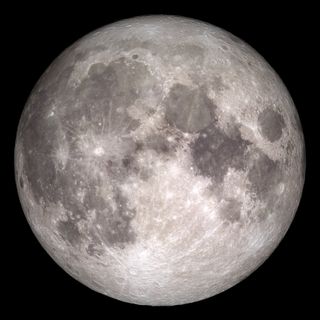
Turkey joins the list of countries hoping to land a rover on the moon by the end of the decade. (Image credit: NASA/GSFC/Arizona State University)
Turkey plans to send a rover to the moon by the end of the decade using a domestically built rocket engine that will first fly to the moon in a test mission in 2023.
Speaking at the Global Space Exploration Conference (GLEX) 2021 in St. Petersburg, Russia, on Tuesday (June 16), Serdar Hüseyin Yildirim, president of the Turkish Space Agency (TUA), discussed details of the country's space program, which was officially unveiled by Turkey's President Recep Tayyip Erdogan in February this year.
The rover, which will be launched in 2028 or 2029, according to Yildirim, will land softly on the moon and collect scientific data on its surface.
Related: The United Arab Emirates' Hope mission to Mars in photos
Click here for more Space.com videos...
UAE astronaut program's newest members revealed
Nora AlMatrooshi and Mohammad AlMulla have been revealed as new UAE astronauts. Credit: MBRSC/UAE Space Agency
Volume 0%
PLAY SOUND
The rocket that launches the moon rover will be domestically built, using a hybrid engine that is currently being developed in Turkey, Yildirim said. To help make sure it's ready for the rover launch, a prototype of the rocket will fly to the moon in late 2023, if all goes according to plan.
"We intend to use our own engine to reach the moon," Yildirim said. "But for this phase, our spacecraft will be brought to low Earth orbit with an international collaboration."
According to a report by the Turkish Anadolu Press Agency, the 2023 mission will make a rough landing on the moon, which will help Turkish engineers to gather data for the soft landing in the late 2020s.
Turkey also plans to send a Turkish citizen to the International Space Station in the coming years to conduct scientific experiments.
"We are trying to finalize our negotiations with the parties," Yildirim said. "In a few months they will be finalized, and we'll start the training process."
Turkey's National Space Program, published in February this year, also foresees the establishment of a local Turkish spaceport and the development of a domestic regional positioning and timing satellite system.
Turkey launched its space agency in 2018. According to the website of German broadcaster Deutsche Welle, the move was criticized at the time, as it took place amid an economic crisis. Supporters, however, claim the space program can motivate researchers and scientists to stay in the country instead of seeking opportunities abroad.
Details of the space program's budget have not yet been revealed.
The space program will allow Turkey to join an exclusive club of only a handful of countries capable of pulling off complex space exploration projects on their own. The announcement of the space program in February took place on the same day that the Emirates Mars Mission, of regional rival United Arab Emirates, successfully entered orbit around the Red Planet.
Follow Tereza Pultarova on Twitter @TerezaPultarova. Follow us on Twitter @Spacedotcom and on Facebook.
Join our Space Forums to keep talking space on the latest missions, night sky and more! And if you have a news tip, correction or comment, let us know at: [email protected].
dBSPL
SENIOR MEMBER

- Joined
- Mar 2, 2018
- Messages
- 7,656
- Reaction score
- 28
- Country
- Location

IMECE, the first submeter observation satellite by TUBITAK, will be launched into space in the last quarter of 2022.
IMECE Program consists of two main projects:
1) IMECE Satellite Subsystems Development Project and
2) IMECE Satellite Platform Development Project.
Based on the heritage and expertise acquired in BİLSAT, RASAT and GÖKTÜRK-2 Projects, IMECE is set to satisfy future sub-meter resolution needs of Turkey as well as to build related infrastructure and capability domestically.
IMECE Satellite Subsystems Development Project wasstarted in 2013 with funding from The Presidency of Strategy and Budget in coordination with Presidency of Defence Industries. These projects composed of several sub- systems such as Electro-Optical Satellite Camera, Communication System, Star Tracker, Sun Sensors Hall Effect Thruster System, Reaction Wheel, Payload Data Storage, Compression and Formatting Unit, and Next Generation Onboard Computer.
IMECE Satellite Platform Development Project wasstarted in 2017 with funding under TUBITAK 1007 Programme.
Similar threads
- Replies
- 0
- Views
- 288
- Replies
- 0
- Views
- 349
- Replies
- 0
- Views
- 260
- Replies
- 5
- Views
- 734


